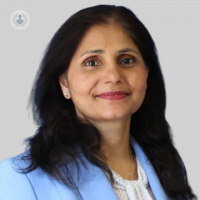Understanding endometriosis: symptoms, diagnosis, and treatment options
Written in association with:Endometriosis is a chronic condition where the layer of tissue that’s found inside the uterus, called the endometrium, grows outside of it. This is a common condition, affecting 1 in 10 menstruating people worldwide. That alone is 1.5 million people in the UK. We sat down with a leading gynaecologist, Miss Preeti Gandhi, to tell us more about the symptoms, diagnoses, and treatment of endometriosis.

What is endometriosis?
During the ovulation period of the menstrual cycle, the reproductive hormones, namely oestrogen, cause the endometrium in the uterus to thicken, and is the egg released by the ovaries is not fertilised, then the endometrium should break down and be purged in the menstruation (period) through the vagina. However, in endometriosis, because the tissue is growing in other places – such as the ovaries, fallopian tubes, rectum, and bladder – it cannot be shed as normal even though it still thickens and breaks down, trapping it in the body. In very rare cases, endometrium can even grow in the lungs, brain, and around the heart!
This tissue that is left behind can cause internal scarring, organ adhesion, and cysts. People with endometriosis are often infertile or have fertility issues.
The cause of endometriosis is still unknown, though there are many theories and it is thought that multiple factors contribute to its formation. One of the leading theories is that of retrograde menstruation, which posits that part of menstrual blood and bits of the endometrium don’t shed downwards through the vagina, but instead flow backwards and up into the fallopian tubes and pelvis, where the endometrial cells attach and begin growing anew. Other theories consider that the condition is triggered by immune system function, stem cell behaviour, and genetics.
What are the symptoms of endometriosis?
The symptoms of endometriosis are:
- chronic pelvic pain
- pain during menstruation and painful cramping
- heavy bleeding during periods
- light bleeding between periods
- pain during sex or vaginal penetration
- pain when urinating or defecating
- stomach issues such as diarrhoea, constipation, or bloating
- fatigue
However, some people with endometriosis will not exhibit all or any of these symptoms, and some women will only discover they have this condition when they get their fertility tested after repeatedly failing to get pregnant.
How is endometriosis diagnosed?
The diagnostic process for endometriosis will begin with a review of the patient’s medical history and a pelvic exam. A gynaecologist will ask the patient about their symptoms and menstruation experience. Afterwards, there will need to be some imaging tests to examine the pelvis and see the extent of the effect of the condition on surrounding tissues – such as an ultrasound (specifically a transvaginal one), or an MRI. A definitive diagnosis, however, can only be with a laparoscopic procedure, where a surgeon makes a small incision in the abdomen and inserts a small and thin tubular camera (the laparoscope) so that they may view the inside of the pelvis in real-time and full colour. During the procedure, the surgeon can furthermore take samples of the tissue for analysis (called a biopsy), or remove some of the damage in the form of growths and cysts.
How is endometriosis treated?
At this point in time, there is no cure for endometriosis, and it can only be managed. Treatment can be medicinal, surgical, or both. A treatment plan will be devised with consideration of the patient’s symptoms, age, plans for future pregnancies, and the severity of the endometriosis.
Treatment will mainly prioritise the patient’s comfort and consideration of their fertility issues, should the patient wish to become pregnant.
Medication tends to be the first method used for treating endometriosis, such as:
- Painkillers for pain management, like ibuprofen or paracetamol. These can be prescribed or purchased over the counter.
- The combined contraceptive pill, which contains oestrogen and progestin (a synthetic form of progesterone), is used to suppress the ovaries and pause or lighten the period and will thus ease pain.
- Gonadotrophin-releasing hormone (GnRH) antagonists are administered via injection and halt the period entirely by lowering the oestrogen levels in the body. They also help shrink endometriosis-related growths and pain, but can cause menopausal-like symptoms.
If medicinal treatment is unfruitful, the option of surgery is available. Using again the laparoscopic technique, surgeons can excise or destroy scar tissue and growths with blades, lasers, or electricity (electrocautery). This can help to alleviate pain, but it is temporary as the endometriosis is still present and the tissue can regrow.
A hysterectomy may be performed for patients who have not responded to other treatments and have no wish for future pregnancies, as this procedure will render patients infertile and irreversible. It is highly effective for reducing pain and may even “cure” the condition, but again there is the risk of the tissue regrowing.
If you believe you may be suffering from endometriosis, book a consultation with Miss Gandhi via her Top Doctors profile.


